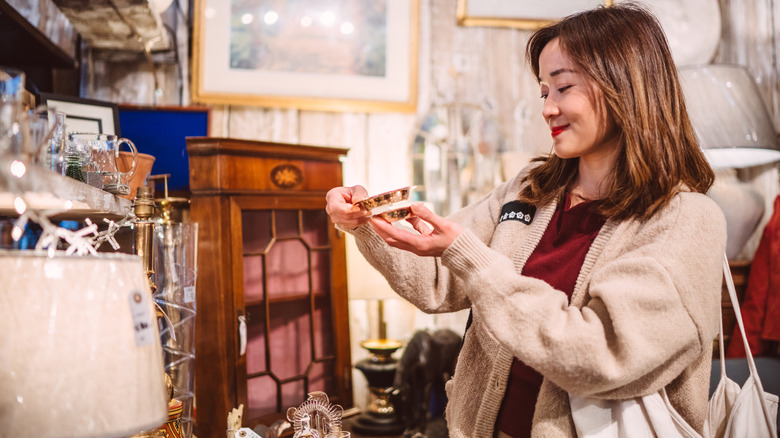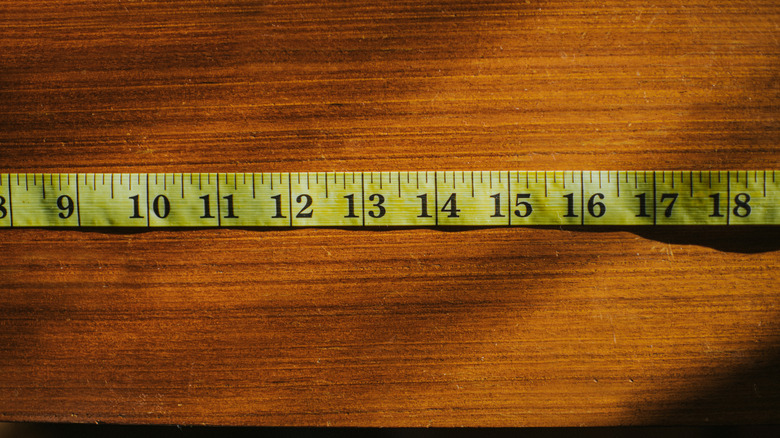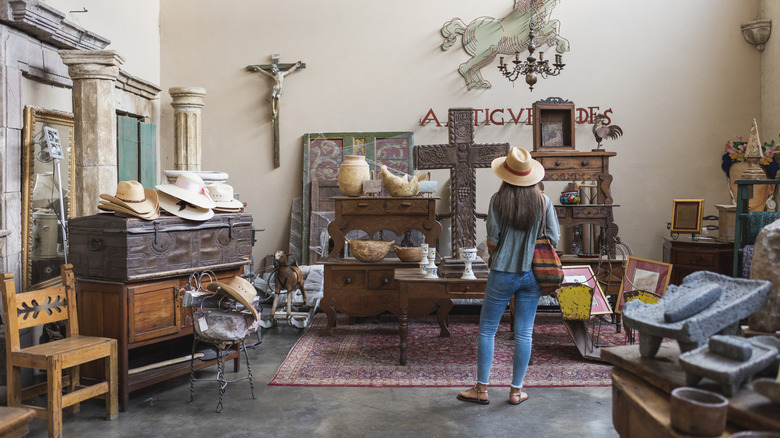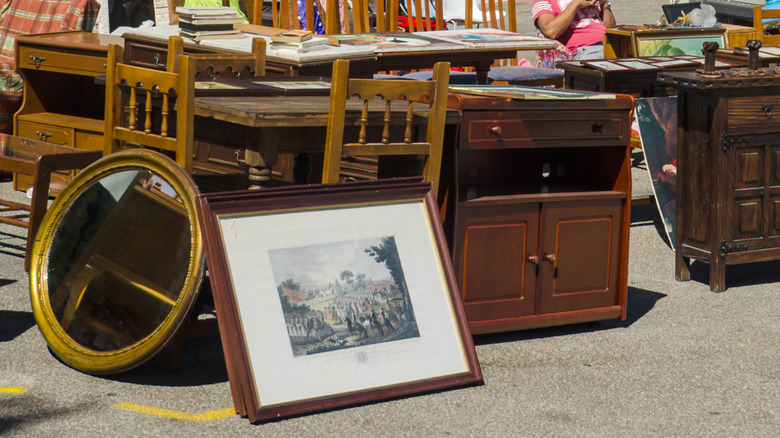10 Common Mistakes To Avoid When Shopping At Estate Sales
Regular shoppers know the promise that estate sales offer — from the unique pieces that you can find to the great deals you can get while shopping. However, even regular sale-goers don't always know the best way to snag these bargains or which pieces they should really prioritize looking for. If you've never been to an estate sale before, but would like to start taking advantage of all they offer, you might not even know where to begin.
To support both newbies and experienced estate sale shoppers, we decided to focus on some of the most important things to avoid during these sales. Understanding the mistakes that others commonly make can help you become a smarter, more prepared, and more successful shopper yourself. If you're ready to learn what to avoid when finding an estate sale, mistakes that could prevent you from being prepared to shop, how to make sure you don't spend more money than you should for a piece, and certain items to avoid overlooking when shopping, you've come to the right place.
Not knowing how to find a good estate sale
If you don't know how to find a good estate sale, you can't expect to find great deals on the items that are most important to you. Relying on word of mouth or local social media groups isn't likely to be enough to help you find the best sales. Instead, look up some of the local estate companies in your area. Keep an eye on their website or social media pages to view information about where and when they will be hosting an estate sale.
Once you see some listings, narrow them down by which neighborhoods or suburbs they're located in. Many wonder how much location matters when estate sale bargain hunting, and the answer is a lot. Events in much more expensive neighborhoods are more likely to have higher-end items (though, you'll also have to be prepared to spend more money on these items). Neighborhoods can also hint at the style of items you'll find. For example, an estate sale in an artsy city neighborhood might offer offbeat and one-of-a-kind furniture and art, while a Victorian home in a historic district may be filled with antiques. At the same time, a modern suburban home will likely have more contemporary finds. Checking the online previews to get a sense of the types of items that will be available can also be very helpful when determining if a specific sale is worth your time.
Shopping before hitting up the ATM
While many estate sale companies are able to process electronic payments, not all of them do. For this reason, the number one preparation tip for hassle-free estate sale shopping is to come with cash. If you don't, and you happen to attend a cash-only sale, you'll be completely out of luck. And, even if the company running the sale is able to accept credit card payments, you might be on the hook for an additional processing fee of about 3%.
To avoid any of these potential setbacks, make a plan to hit up the ATM on your way to the sale or the night before you're going to shop. If you've previewed the items that are going to be listed, you should have a decent idea of what you're going to spend. Shopping with cash can also help you stay within a budget — if you don't want to spend more than $300, don't take it out of your bank account.
Not bringing everything you'll need with you
You don't want to realize that you forgot something at home after you've already started shopping or are trying to decide whether a certain piece will work in your home. To avoid this happening, it is important to make sure you're set with everything you might need before you leave home. One important item to pack is a tape measure. You'll want to be able to confirm that a piece of furniture or artwork will fit in the spot you're envisioning for it (don't forget to also take measurements of your home before leaving).
You'll also want to think about how you'll package any items you purchase. Some of the other unexpected essentials to bring to an estate sale include a few boxes, bags, and packing paper/bubble wrap. These will make sure you're able to protect fragile items during transport. However, while you want to come prepared, you won't want to haul everything into the sale with you. Carrying something like a bulky backpack filled with supplies could cause you to inadvertently knock something off a shelf. Instead, carry in a smaller purse or bag with your wallet, a measuring tape, and maybe a magnifying glass, and leave the bulkier boxes and packaging supplies in the car.
Arriving late
While some shopping excursions can be done at your leisure, you shouldn't put heading to an estate sale in that same category. If you end up getting to the sale too late, many of the best finds may already be gone. Moreover, many estate sales limit how many people are allowed inside at one time. So, if you get there late, you may have to wait even longer to get inside.
To avoid this mistake, you'll want to carefully think out your plan at least a day ahead of time. Look up the start time of the sale, use your phone's GPS to determine how long it will take you to drive there, and add a few additional minutes in to account for traffic or other unexpected delays. Instead of aiming to get there right at the start of the sale, you'll be even better off planning to arrive at least 15 minutes early. However, if it's a quality sale, some experts recommend showing up an hour prior. This way, you can get a spot in line (or be given a number to use to enter once the doors open).
Failing to follow unwritten etiquette rules
The family or company hosting the estate sale might offer some printed rules for the sale. However, even if you are not formally given any rules, that doesn't mean that there are no guidelines to follow. There are several unwritten etiquette rules, and ignoring any of these can make you appear rude or insensitive.
So, what are these etiquette rules for shopping at an estate sale? One of the most important things to think about is being respectful. This applies to how you shop during the sale (not running or cutting in front of others) and how you treat the property and items that are for sale (handling everything with care, removing your shoes if requested). Moreover, being respectful also includes what you say and how you say it. You don't know who is listening when you're talking, so avoid making any rude remarks about the home's style, cleanliness, or overall vibe. If any family members are there, remember that they are likely going through a difficult time (since sales are often held around the death of a loved one or another major life change). For this reason, you should avoid asking questions that might be considered insensitive.
Trying to haggle — especially on the first days of the sale
If you're new to shopping at estate sales, it's understandable why you might assume that they work like a yard sale. Because of this, if you see an item you want, you might try to make a lowball offer, expecting the hosting company to meet you halfway. However, while haggling and negotiating is acceptable at a yard sale, estate sales are a different story.
For the most part, you should expect to pay the labeled price for a given item, especially on the first day. Negotiations are rarely allowed early on in the sale — why would they want to start negotiating when they have more days to find a buyer who is willing to pay full price? However, check with the company hosting the sale, as some may begin to allow shoppers to make an offer towards the end of the sale.
Not being picky when shopping for furniture
You've probably heard that furniture is one of the main draws of an estate sale. Many buyers leave with valuable pieces, either to add to their home collections or to resell for a higher price. However, that doesn't mean that every piece of furniture you encounter is going to be a good buy. For example, if you buy a piece of furniture that is damaged, not only are you setting yourself up for a project that may or may not be successful, but the value of the item is also reduced since it is chipped or scratched. Similarly, if you don't know much about furniture construction, you might end up buying a cheap piece of furniture for more than it's worth since you don't know what features to look for to determine its value.
Instead, go prepared knowing the kinds of furniture you should always check out at an estate sale. Solid wood pieces are one thing to keep your eyes out for. Solid wood furniture holds its value well and will be much easier to restore than items with a veneer coating. One other tip for buying quality wood furniture at an estate sale is to assess the overall stability and quality of construction. Check for wobbliness, look for dovetail joints on drawers, see if there are any manufacture stamps you can Google, and double check if the back of the piece is also wood or just MDF.
Picking up just any piece of artwork
Looking past the artwork at an estate sale can be a big mistake. However, it will also be a mistake to just grab any piece of art you find without putting any thought into it. While art is one of the most valuable things to look out for, you want to steer clear of any scams by asking for documentation and even comparing the signature on the piece to images of other artwork by the artist. If you're thinking about purchasing a print, you can also verify its authenticity and get an idea of how rare it may be by looking for a number. For example, is the print number 1 out of 20 or number 456 out of 1,000? Clearly, the first of these indicates that a much more limited quantity was printed.
While finding valuable pieces can be an important goal, you'll also have to consider why you are shopping. Are you shopping for a new piece to serve as the focal point in your living room, or are you looking to add something to a collection or resell it? Your answer to this question should help you keep your priorities straight. For example, if you are drawn to a piece of art and want to display it in your home, you might care less about how much it is actually worth than if you're looking to resell something.
Buying items that are more trouble than they're worth
You can definitely score some great finds at an estate sale. However, it is important not to get so caught up in the excitement that you end up buying something that you shouldn't. Beyond prioritizing items that you either will use personally, that you will add to a curated collection, or that you are planning on reselling, it is important to really weigh each purchase to avoid buying something that is more trouble than it is worth.
For example, while some vintage light fixtures and other electronics might look really neat, you'll want to be realistic about whether you'll actually be paying to have these items rewired. Or if there is a scratched up wooden dresser you love, but you have never refinished anything before, be honest whether or not you will take the time to learn how to do so. If the answer to either of these questions is no, then you're probably best just walking by anything that will need a lot of work.
Being afraid to ask questions
There's no such thing as a stupid question, so don't make the mistake of being afraid to ask any questions that come up. The people running the sale are there to help. Their goal is to move the pieces that are for sale, and responding to the inquiries of shoppers will help them achieve this goal. Feel free to ask the team specific questions about a piece you're considering, such as its history, how old it is, or if a piece has been with the family for several years. You could also ask about more general topics, including requesting help to find an item that matches something you're looking to add to your home.
In addition to asking questions during the sale itself, don't be afraid to call before the sale even starts if you are looking for more information. Speaking with someone organizing the event will allow you to learn more about specific items that have caught your eye to decide if they would actually be a good fit.










